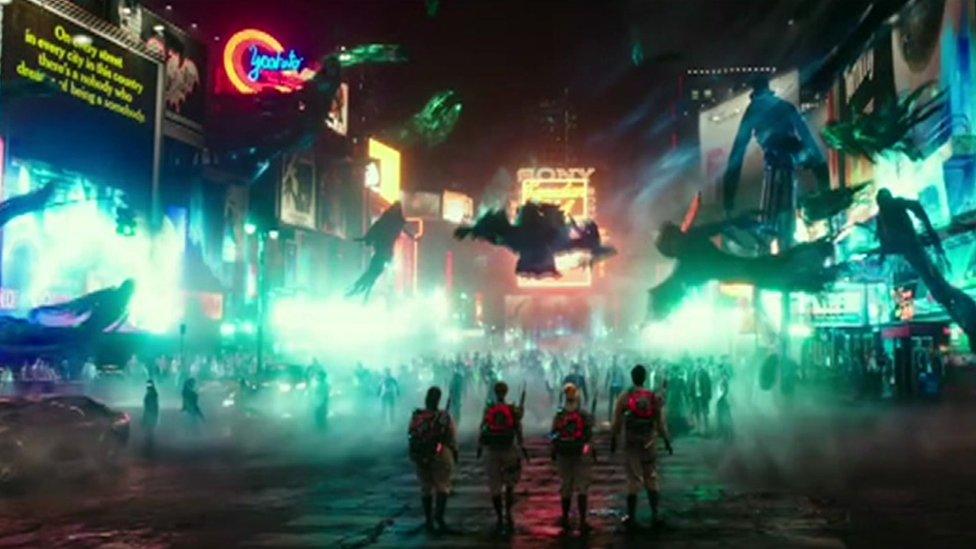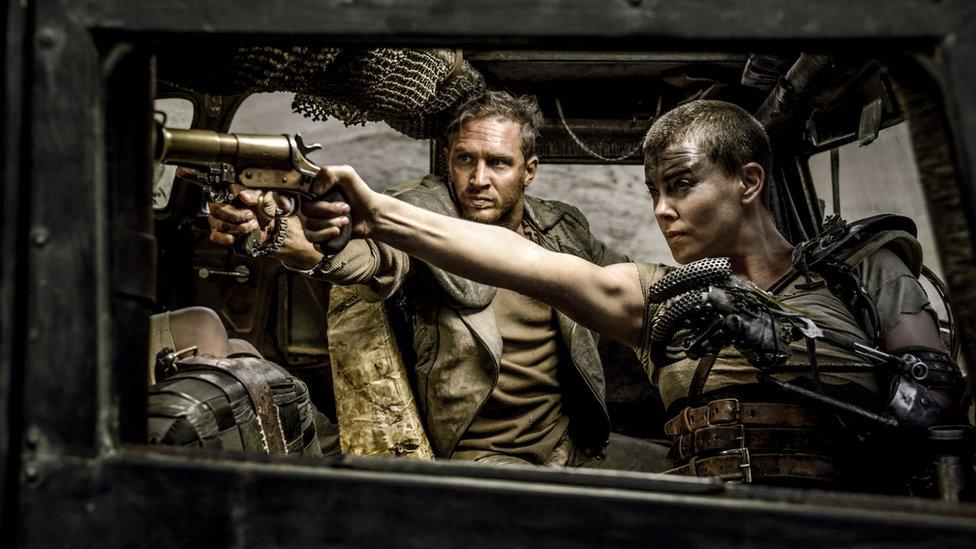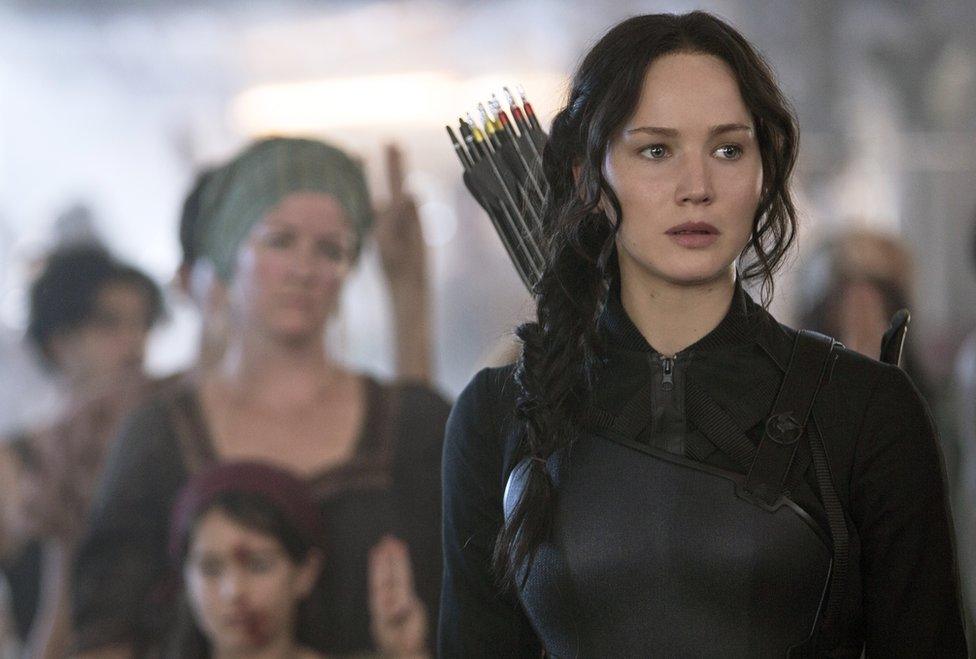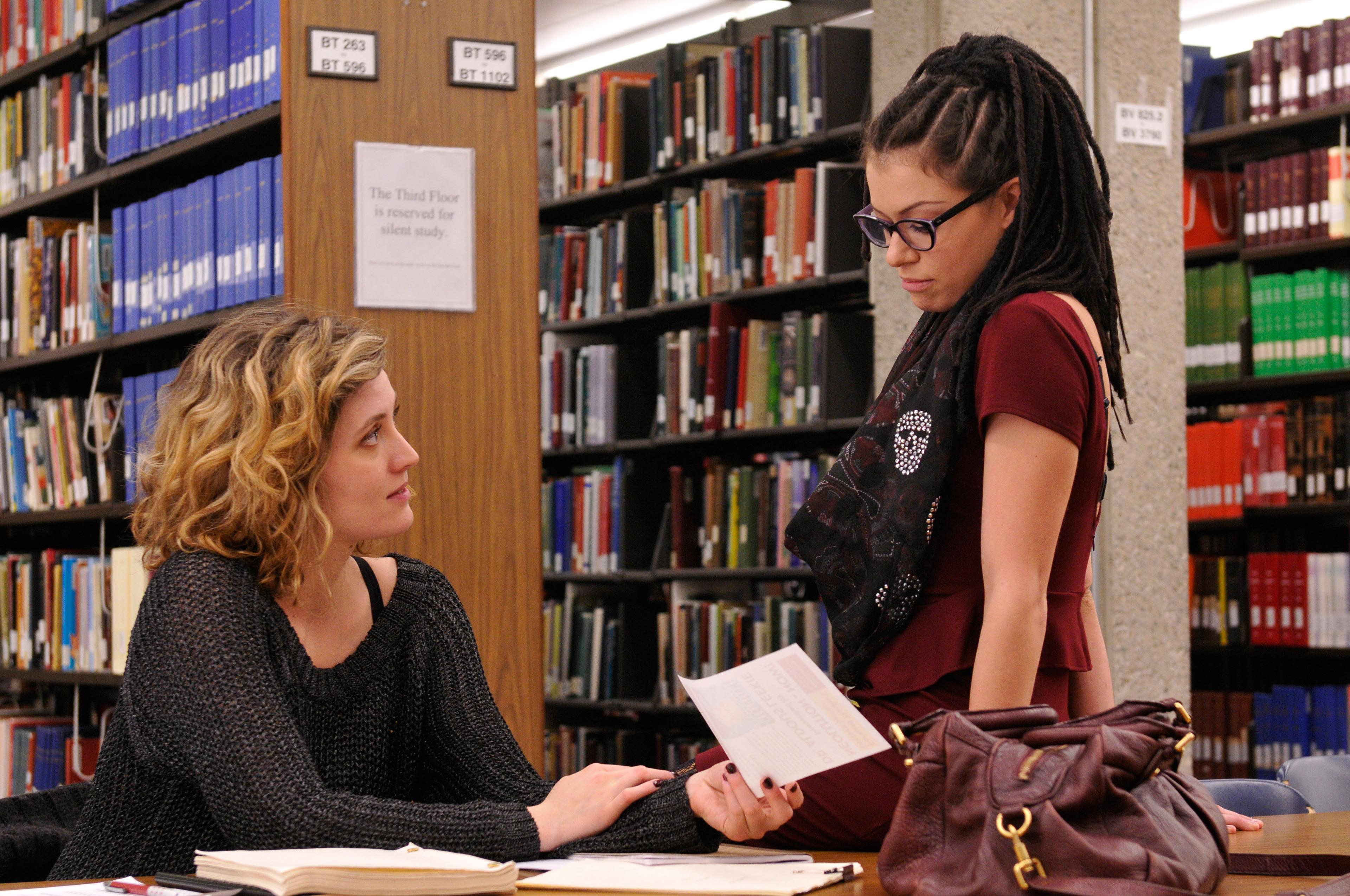International Women's Day: Why women can thrive in sci-fi
- Published
The stand out heroines in sci-fi
Female characters are often given a raw deal in action films - simply fulfilling the role of love interest or assistant - but the flexible rules of the science fiction setting can empower and liberate female protagonists.
Twenty years before Jurassic World's heroine, with impractical high heels, would inspire eye rolls around the world, Laura Dern's no-nonsense paleobotanist responded to moralising about the dangers of cloning dinosaurs in science fiction blockbuster Jurassic Park with two simple sentences: "Dinosaurs eat man. Woman inherits the earth."
Beyond the joke of a utopian all-female society, a recent viral meme repurposed the memorable scene with a reference to Star Wars: The Force Awakens, and its protagonist Rey, by suggesting that "woman inherits the franchise". May the force be with her.

The new Ghostbusters film features four female protagonists
While the Star Wars expanded universe has a number of popular, female characters, the cultural impact of seeing a female Jedi's hero journey on the silver screen can not be overstated. "For years we've been hearing that women couldn't front a sci-fi/action film," Jenna Busch, founder of Legion of Leia.
"The fallacious perception is that they just won't sell. But, now we have Katniss, Furiosa, and Rey to prove that attitude wrong. There is something about seeing the box office numbers that might be a step in the right direction."

What is International Women's Day?
International Women's Day, external has been held on 8 March every year since 1913, and has been recognised by the United Nations since 1975.
The UN says it's a time to reflect on progress made, to call for change and to celebrate acts of courage and determination by ordinary women who have played an extraordinary role in the history of their countries and communities.
The theme of this year's day is "Planet 50-50 by 2030" - aiming to achieve global equality in areas such as education and end all forms of discrimination.
Read more on International Women's Day

Science fiction literature has a long tradition of feminist exploration of the perils and potential of technology, the future, otherness, and the unknown. Reproductive politics were explored in Margaret Atwood's The Handmaid's Tale. Survival in dystopian lands ruined by greed and environmental distress is addressed through the perspectives of female teenage protagonists by Octavia Butler in Parable of the Sower and The Hunger Games trilogy by Suzanne Collins. Gender and sexual politics are found throughout the works of Ursula K Le Guin.

But finding complicated female heroes in film and television has often felt as impossible as finding food in a dystopian wasteland or as daunting as winning the aforementioned Hunger Games. They are there - some are even iconic.
Take, for example, Nichelle Nichols' Lt Nyota Uhura - a groundbreaking vision of black womanhood on television in the 1960s series Star Trek. Or Terminator 2: Judgment Day's Sarah Connor, embodied by Linda Hamilton, with lioness ferocity and a radically muscular physique that challenged notions of female bodies and good motherhood.
Perhaps more so than other genres, including fantasy, spy-fi, and superhero, science fiction provides unique space for provocative and revolutionary considerations of gender, bodies, power, reproduction, community, and heroism.

Jennifer Lawrence stars as Katniss in The Hunger Games
Women enslaved as breeders in Mad Max: Fury Road (2015) are given voice and agency. As our hero Furiosa (Charlize Theron, pictured above) collaborates with The Five Wives, and later with the matriarchal Vuvalini, their rejection of the toxic masculinity that has poisoned the world becomes a mediation on the hope of a new world built out of compassion.
Compassion is also a trait exemplified by sci-fi heroine Katniss Everdeen. In The Hunger Games she also exists in a dystopian world destroyed by greed, but she sacrifices herself for her sister by volunteering as tribute. Later, she challenges systemic oppression with a defiance that inspires a revolution. While her stakes are personal, she gains understanding that her actions are to the benefit of the society as a whole as well.
"The interesting thing about Fury Road was that its female protagonist was a woman, not a girl, with many years of experience and skill," says Dr Lorna Jowett, who specialises in film studies at the University of Northampton. With young women like Rey and Katniss discovering their potential, it is both unusual and welcome to see a middle-aged heroine in the genre.

Female community is at the heart of Orphan Black
That may be, Jowett suggests, because "in film and TV there are still commercial and industrial conventions to follow to make a successful product, so there may be limits imposed on the creative imagination" but, as she notes, Orphan Black is one of the most interesting female-centred science fiction series in recent years.
"It literally presents multiple versions of femininity without judging or ranking them," says Jowett.
Orphan Black also looks at reproduction and motherhood - themes addressed in the Alien films as well as in The X-Files, through the character Dana Scully. But unlike Ripley or Scully, the sister clones have a community of women ranging from sibling to child to mother and grandmother. Orphan Black uses female support to stress that identity comes from both nature and nurture, and female community is the core of its narrative.
Sci fi Jennifer
Sometimes, though, women's narratives in sci-fi don't need to present a deeper philosophical message. Their very presence is the message.
Perhaps like astronaut Mae Jemison, who was inspired to join Nasa by seeing Lt Uhura on television, a young girl will be inspired by these new female sci-fi heroines to become a hero of her own.
Jennifer K. Stuller is a pop culture historian specialising in female heroes in modern mythology.